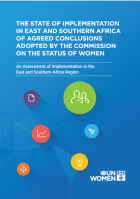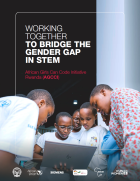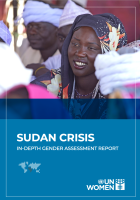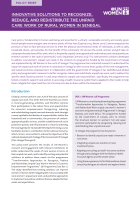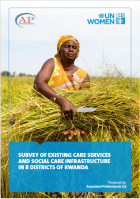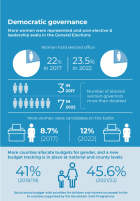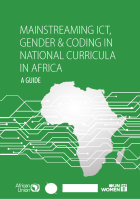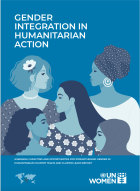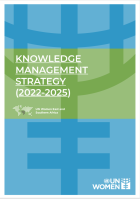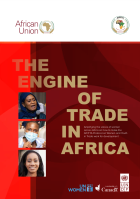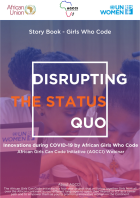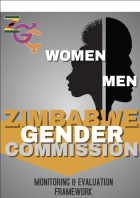1 - 20 of 29 Results
Pagination
Date:
The Commission on the Status of Women (CSW) monitors gender equality commitments and the Beijing Declaration. A study by UN Women East and Southern Africa assessed CSW63–CSW66, finding strong treaty ratification but weak policy implementation. Challenges include inadequate funding, weak national preparations, and limited African influence in CSW negotiations. Recommendations include strengthening coordination, enhancing stakeholder engagement, and improving CSO participation to boost Africa’s impact in global gender equality discussions.
Date:
This report showcases the transformative journey that the AGCCI alumni in Rwanda have embarked on, paving way to becoming the innovators and change makers of the present and future.
Date:
The UN Women Kenya Annual Report highlights key achievements in advancing women’s empowerment and gender equality.
This report showcases progress in increasing women’s leadership and political participation, strengthening economic empowerment, eliminating violence against women and girls, engaging women in peace and security efforts, and enhancing planning and coordination.
UN Women Kenya remains dedicated to building a future where women are at the heart of developing resilient and sustainable communities.
Date:
This brief emerges from the UN Women East and Southern Africa Knowledge Management Strategy 2022-2025. In the period of the Strategic Note (2018-2021), ESARO leveraged its knowledge management (KM) strategy (2018-2021) and developed KM tools and systems and ensured a systematic approach to KM implementation across the region.
Date:
The assessment utilized the gender inequality framework used in humanitarian settings. The framework considered how the gender inequalities prevalent in pre-conflict contexts are exacerbated by conflict dynamics and how the impact differs with different gender roles. The framework indicates that the humanitarian responses should consider the basic livelihood needs and investigate and address some strategic issues that promote
Date:
This Report presents the Africa Shared Research Agenda (ASRA) for ending gender-based violence (GBV), which was developed though a collaboration between UN Women Africa and the Sexual Violence Research Initiative. The ASRA is a set of research priorities for the field, developed through a participatory and consultative process and aims to inform investments in research over the coming 5-10 years for ending GBV in Central, East, Southern and West Africa.
Date:
This background paper aims to inform policy and processes that place African women and girls at the centre of change in tech and innovation and the inevitable transformation to Africa’s development.
Date:
This infographic is based on the results of an assessment of rural women's needs, carried out as part of UN Women's 3R Program in Senegal. It illustrates the challenges of unpaid care work faced by rural women, as well as innovative solutions and policy measures to address these needs, and to recognize, reduce and redistribute rural women's unpaid care work.
Date:
This policy note presents the results of the assessment of the needs of rural women, carried out as part of the 3R Programme in Senegal, and namely the unpaid-care work related needs faced by rural women, along with the innovative solutions and policy measures needed to address these needs and recognize, reduce, and redistribute rural women's unpaid care work.
Date:
The likelihood of "economic disempowerment" is increased due to the unequal load of unpaid care duties placed on women and the human development outcomes of both the women and those being cared for may be impacted because women in the paid labor market may not be able to adequately fill their caregiving duties (Deepta & Zambelli,2017).
Date:
Our priority areas:
• Governance and participation in public life
• Women’s economic empowerment
• Ending violence against women and girls
• Women, peace and security, humanitarian action, and disaster risk reduction.
Date:
The Guide "Mainstreaming ICT, Gender & Coding In National Curricula In Africa Guide" provides strategies designed to systemically mainstream gender, coding and ICT into national curricula across Africa. The Guide will serve as a starting point for education ministries, educational stakeholders and leadership teams looking to understand the best ways to go about integrating computing and gender into the national curriculum of secondary education.
Date:
Innovation and technological change, and education in the digital age for achieving gender equality and the empowerment of all women and girls.
Date:
The assessment focused on HCTs and Cluster Working Groups (CWGs) in recognition of the central role they play in planning and coordinating humanitarian responses. Survey findings showed that the overall knowledge of Gender integration in Humanitarian Action (GiHA) was average, with just over half of the HCTs and Clusters
reporting a working knowledge and only one third (33 percent HCTs and 25 percent clusters) reporting comprehensive knowledge.
Date:
Key initiatives in the ESA KM Strategy (2022-2025) include sustaining the review and update of country gender equality profiles by all the 13 countries in the region, increasing momentum on the use of established KM systems and tools; institutional learning; quantitative and qualitative research and analyses on GEWE; capacity strengthening for R/M/COs on KM interventions; quality assurance processes of knowledge products; evidenced based advocacy and documentation and development and repackaging of knowledge products.
Date:
A consolidated regional report from national consultations and online regional surveys of women in trade held in preparation for the launch of negotiations on the Protocol on Women and Youth in Trade to the Agreement establishing the
African Continental Free Trade Area (AfCFTA)
Date:
Innovations during COVID-19 by African Girls Who Code
Date:
The Annual Report captures the work of UN Women in Zimbabwe to accelerate Gender Equality and Women's Empowerment in Zimbabwe. It highlights the organisation's initiatives, challenges and milestones achieved in 2021.
Date:
The ZGC M&E Framework aims to guide gender programmes at the national level and provide guidance on Monitoring and Evaluation.
Date:
This report highlights UN Women Nigeria’s work for the year 2020. The report builds around the Nigeria Country Office programmatic areas of intervention and reflects the achievements attained in collaboration with various government and non-governmental partners who contributed to policy advocacy efforts, delivery of services, implementation, and funding of interventions aimed at promoting gender equality and women’s empowerment. The population at large (men, women, boys...

